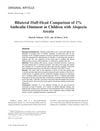JAK inhibitor that reduces inflammation and immune attacks on hair follicles, leading to potential hair regrowth, especially in alopecia areata cases
natural substance from Neem tree with medicinal and pesticidal properties
signaling protein that, when suppressed, may grow hair by reducing inflammation and stem cell loss
glycoprotein that inhibits TGF-β and promotes hair growth by antagonizing activin



